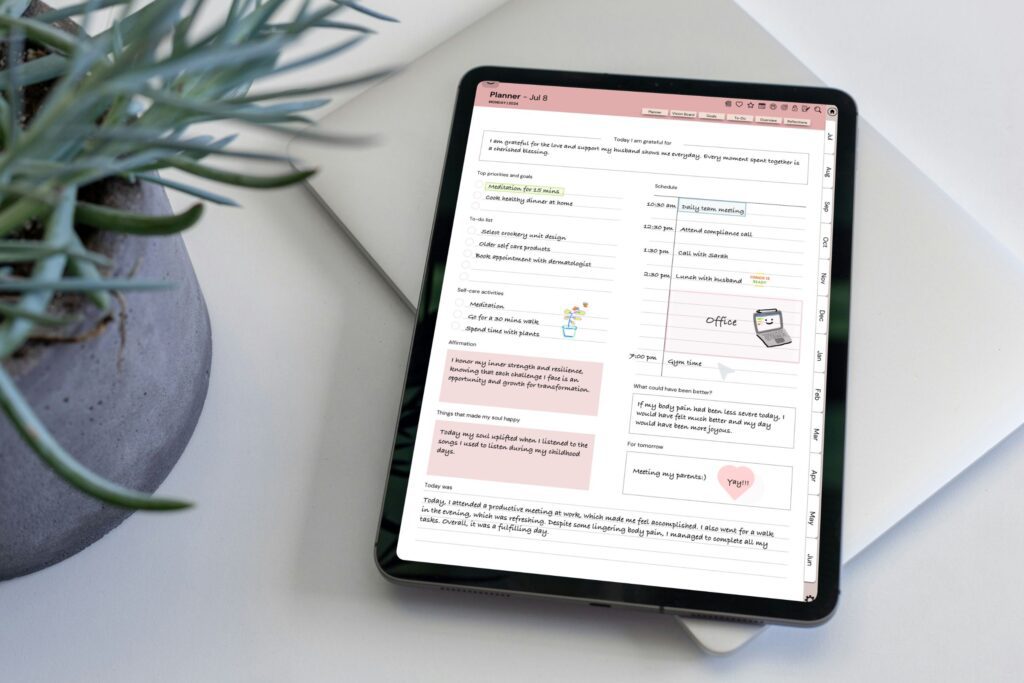Tell me how many times this has happened to you – You pick up your phone to check something real quick, but without even realizing it you spent half an hour scrolling through social media.
Or maybe you’re eating dinner while watching TV or catching up on work, only to realize you don’t even remember the taste of your meal, and now you’re either still hungry or feeling way too full.
Or you’re having a conversation with a friend or family member, where instead of being fully present, your mind is thinking about something totally unrelated.
Or perhaps you walk into a room and suddenly forget why you went there. Maybe you put something down and, in an instant, forget where you placed it because your mind was somewhere else entirely.
Quick often I believe, but you’re not alone.
These moments of mindlessness happen to all of us, probably more often than we’d like to admit. It’s like we’re on autopilot, going through the motions without really being present in what we’re doing.
And when we snap back to reality, we feel stressed, frustrated, and sometimes even disconnected from our own lives.
Sometimes, it even creeps into our downtime. You could be watching a TV show or a movie, and suddenly realize you have no idea what’s going on because your mind has been wandering the whole time.
These moments might seem small if they happen too often, but they can add up and make us feel out of sync with ourselves and the world around us.

Living like this, constantly distracted and not fully engaged, can take a toll on our well-being. They are not ideal for a happy and fulfilling life.
In fact, when these moments of mindlessness become the norm, they can keep us from truly enjoying our lives, appreciating the present moment, and connecting with the people around us.
But it doesn’t have to be this way. We can break free from this cycle of mindlessness and start living a more mindful and intentional life.
And it all starts with building healthy habits that bring us back to the present moment.
Mindfulness isn’t about trying to control every thought or forcing yourself to be present 24/7. It’s about creating small, simple habits that help you stay connected to the here and now. These habits can make a big difference in how we experience life.
In this blog, we’re going to explore some of the healthy habits that can help you live a more mindful life.
These aren’t complicated or time-consuming practices—they’re small changes you can start making today that will help you feel more present, less stressed, and more connected to yourself and the world around you.
So, if you’re ready to stop living on autopilot and start living a life that feels more intentional, keep reading. You might just find that these simple habits are the key to living a more mindful and peaceful life.
Table of Contents
What Is the Meaning of a Mindful Life?
In simple terms, a mindful life is all about being present and fully engaged in the moment.
It means paying attention to what’s happening around you and within you rather than getting lost in thoughts about the past or worries about the uncertainties of the future.
Living mindfully doesn’t mean you have to sit in meditation for hours or be perfectly zen all the time. It’s more about making a conscious effort to notice the little things that often go unnoticed.
It’s about savoring that first sip of coffee in the morning, truly listening when someone’s talking to you, and being aware of how you’re feeling, physically and emotionally, throughout the day.
Being mindful also means letting go of the need to multitask.
Instead of trying to juggle ten things at once, mindfulness is about focusing on one thing at a time so you can give it your full attention. This will not only help you be more effective in what you’re doing but also enable you to experience each moment more deeply.
When you live mindfully, you become more aware of your thoughts, feelings, and actions. This awareness helps you make choices that are in line with your values and well-being.
It’s about living intentionally, rather than just reacting to whatever comes your way.
What Are Mindful Habits?
Mindful habits are simple, everyday habits or practices that help you stay connected to the present moment. They’re the little things you do that bring your awareness back to where you are, what you’re doing, and how you’re feeling right now.
These habits aren’t about perfection or turning your life upside down, but about finding small ways to be more intentional in your day-to-day activities.
Mindful Breathing
One of the most common mindful habits is mindful breathing. Taking a few deep breaths, especially when you’re feeling stressed or overwhelmed, can instantly bring your focus back to the present.
It’s a quick reset that helps you center yourself and let go of whatever was distracting you.
Mindful Eating
Mindful eating is when you choose to fully experience your meal rather than just going through the motions. Instead of rushing through a meal or eating while distracted, take the time to really taste and enjoy your food. Notice the flavors, textures, and aromas with each bite.
The more present you are, the better you can appreciate the food you eat and become more aware of your body’s hunger and fullness signals.
Mindful Listening
Mindful listening is about being fully present when someone is speaking to you.
Instead of thinking about what you’re going to say next or getting distracted by your phone, focus on the other person’s words, tone, and body language.
Mindful Walking
Even something as simple as walking can be turned into a mindful habit. Pay attention to the sensation of your feet touching the ground, your body’s movement, and the environment around you as you walk.
Whether it’s a walk to your car or a stroll in the park, let yourself fully experience the act of walking. You can transform this routine activity into a calming, grounding practice by slowing down and connecting with the present moment.
How Can I Live a More Mindful Life – 7 Healthy Habits
To live a more mindful life, it’s about making small, intentional changes that bring you back to the present moment.
These changes don’t have to be complicated or time-consuming, they’re simple habits that, when practiced daily, can make a big difference in how you experience life.
1. Meditation
The first habit for living a more mindful life is meditation. Mindfulness is all about learning to control our thoughts and bring them back to the present moment, and meditation is the key to learning this skill.
Our minds are of a monkey nature because just like a monkey jumps from one branch to another, our minds have a natural tendency to jump from one thought to another. Because of this, it becomes difficult for us to stay in the moment.
Meditation teaches us how to calm this restless mind. It is not about forcing your mind to be blank or pushing your thoughts away, instead, meditation teaches you to observe your thoughts without getting caught up in them.
Over time, this practice will teach you to gently guide your focus back to the present, even when your mind starts to wander.
Learning to control your thoughts lays the foundation of all other mindful habits, and meditation will teach you just that.
When you can direct your attention where you want it to go, rather than being at the mercy of your mind’s constant distractions, you will have better control over your life.
So, incorporate this habit into your daily life. Start with a few minutes a day and gradually increase this time as you get more comfortable with it.
2. Journaling
The next habit to cultivate for a more mindful life is journaling. Journaling is the simple but powerful practice of writing down your thoughts, feelings, and emotions.
It’s a way to get in touch with yourself, explore what’s on your mind, and bring more clarity to your daily life.
When you journal, you’re not just recording what happened during your day, you’re also taking the time to think about how you felt, what went well, and what could have been better.
Journaling gives you an opportunity to learn from your experiences, notice patterns in your thoughts and behaviors, and identify areas where you might want to make changes.
This process of reflecting on your life is a core aspect of mindfulness because it encourages you to be more aware of your inner world and the impact it has on your outer life.
Journaling also provides you with space to practice gratitude and affirmations. Both these practices give you a more optimistic and appreciative mind that eventually gets trained to focus on the positive aspects of your life.
Apart from mindfulness, journaling is an excellent way to organize your day, plan your tasks, and set goals. You can create a clear roadmap for the day by writing down what you need to do and how you want to do it.
This habit will keep you on track and prevent you from being overwhelmed as you’ll not be constantly trying to remember everything you need to do.
Both of us have also started journaling a few weeks back and we can personally vouch for its benefits. It has now become a part of our daily routine that keeps us grounded, focused, and in line with our goals.
In fact, we’ve even designed our own Mindful Living Digital Journal, a daily planner and tracker created with all these aspects in mind.
It’s a tool to help you practice mindfulness, gratitude, affirmations, and self-care while also keeping your life organized and moving forward.

If you’re interested in starting your own journaling journey, we invite you to check out our journal. It’s been a wonderful companion for us, and we hope it can be the same for you.
A few blogs on journaling:
- What Is Journaling and What Are Its Benefits?
- What Are The Different Types of Journaling
- 5 Simple Steps to Start Journaling for Mental Health
- How and Why You Should Start a Gratitude Journal
- How to Journal for Personal Growth and Self-improvement
- What Is a Manifestation Journal and How to Journal for Manifestation
- How to Start a Health and Wellness Journal
- How Can Journaling Boost Your Productivity
- How to Journal for Overthinking
- What Is a Morning Journal and How to Journal in the Morning?
3. Turn Off Distractions
Meditation and journaling will give you a foundation to start living a mindful life. After incorporating these two practices, let’s now move on to some changes you have to make in your everyday routine.
The next habit you have to incorporate is to remove unnecessary distractions from your life. There are so many distractions in this modern-day world, the biggest one is our mobile phones.
They buzz, beep, and vibrate every few minutes, pulling our attention away from whatever we’re doing.
One of the simplest and most effective ways to reclaim your attention is to turn off all unnecessary notifications. Keep the ones for calls and messages, but mute the rest.
Social media is a very helpful tool if used wisely, but it is also the main source of distraction if it is filled with content that doesn’t add value to your life.
So, update your social media feed to show topics you’re genuinely interested in and that align with your goals. Search for and follow the topics you’re genuinely interested in and that support your personal growth.
As you regularly engage with such topics, your feed will gradually update to show more of what’s meaningful to you, turning social media into a tool that supports your mindfulness rather than detracts from it.
Also, set dedicated times for using social media. Instead of opening your apps every time you have a few minutes to spare, choose specific times during the day to check-in.
This way, you are in control of how and when you use social media, not the other way around.
4. Declutter Your Space
The next habit for a mindful life is to declutter your space. Your physical environment has a powerful impact on your mental state.
When your surroundings are cluttered, your thoughts also become cluttered and overwhelmed, making it difficult to focus, relax, and be at peace.
So, take some time to declutter your space so you create a sense of order and calm that will help you feel more centered and grounded.
Start by clearing out the things you no longer need or use. Organize your belongings in a way that makes them easy to find, add some plants or natural elements, or just rearrange your furniture to create a more harmonious flow.
When your space is clean and organized, it will be easier to focus on your tasks, unwind at the end of the day, and enjoy the simple pleasures of life.
5. A Healthy Lifestyle
Living a healthy lifestyle is a very important part of leading a mindful life. When you take care of your body, mind, and spirit, you create a strong foundation for mindfulness and overall well-being.
A healthy lifestyle isn’t just about one aspect of your life, it includes everything from the food you eat to the way you move, sleep, and connect with the world around you.
Let’s take a look at some of the aspects or dimensions of a healthy lifestyle.
A. A Healthy Diet
It goes without saying that a healthy diet is an essential part of living a healthy lifestyle as the food you eat directly impacts your mental and physical health.
Go for healthy, fresh, and wholesome food that supports your overall health and well-being.
Mindful eating is also an important aspect of maintaining a healthy diet. As we discussed earlier, slow down and truly savor your meals so you become more in tune with your body’s hunger and fullness cues.
Choosing healthy, nutritious foods and eating them mindfully not only supports your physical health but also improves your overall sense of well-being.
B. Physical Activity
Staying active is another vital component of a healthy lifestyle. Regular physical activity keeps your body strong, boosts your energy, and positively impacts your mental health.
Whether it’s walking, swimming, or engaging in more intense exercise, find something you truly enjoy so it is easier to stay consistent.
You can also include yoga and stretching in your daily routine. They are particularly beneficial because they combine physical movement with breath awareness, helping you connect your body and mind.
C. Healthy Sleep Cycle
A healthy sleep cycle and good quality sleep are very important for your well-being because your body repairs itself while you’re asleep, and your mind rests and recovers for the next day.
Having a healthy sleep cycle is about setting consistent bedtime, reducing screen time before bed, and doing some calming activities like reading a book.
D. Spend Time in Nature
Lastly, stay connected with nature through simple activities like taking a walk in the nearest park, spending some time in your garden, or just going to the balcony to breathe fresh air and be among your plants.
Fully experience the natural world around you. Listen to the sounds of birds, feel the wind on your skin, and take in the sights and smells of your surroundings.
This mindful connection to nature can help you slow down, reduce stress, and feel more connected to the world around you.
6. Single-tasking
In today’s fast-paced world, we’re constantly being told that productivity is the ultimate goal. We’re encouraged to get as much done as possible, as quickly as possible, and multitasking is often seen as the key to achieving that.
Many of us create long to-do lists and try to juggle multiple tasks at once, thinking that we’re making the most of our time. But the truth is, our brains aren’t designed to handle multitasking effectively.
When we try to do too many things at once, our attention becomes fragmented, and we’re more likely to make mistakes. Rather than being more productive, multitasking often slows us down, lowers the quality of our work, and leaves us feeling mentally drained.
Our minds work best when we focus on one task at a time, fully engaging with what we’re doing. This practice is known as single-tasking and is a powerful way to boost productivity while also cultivating mindfulness.
Single-tasking is about focusing on the task at hand which improves your concentration levels and reduces the chances of error.
When you focus on one thing at a time, you’re able to give it your full attention, which not only improves the quality of your work but also makes it more enjoyable.
You become more present in the moment, fully immersed in whatever you’re doing, whether it’s working on a project, cooking a meal, or having a conversation.
By single-tasking, you’ll find that you’re actually more productive and efficient. Instead of constantly switching between tasks and losing focus, you’ll complete each task more quickly and with greater accuracy.
And perhaps most importantly, single-tasking helps you to feel more grounded and less stressed, as you’re no longer trying to keep track of multiple things at once.
7. Detox
In today’s world, everything seems to be just a click away. Whether it’s ordering a pizza or buying something online, we’ve grown accustomed to instant gratification.
We don’t have to wait for much anymore for anything, and while that might seem convenient, it’s had an unexpected effect on us.
Our brains, particularly our dopamine receptors, have become so used to this constant flood of instant rewards that they’re no longer as easily stimulated.
We are always searching for the next thing that can make us feel good, but the satisfaction doesn’t last long.
At the same time, we’re more connected than ever through social media, yet ironically, this constant connection has left us feeling more disconnected from the people around us.
We spend so much of our time glued to our phones and digital devices that we miss out on the real-life moments that truly matter. This constant bombardment of digital noise makes us feel overwhelmed, stressed, and even a bit lost.
That’s why, it is very important for us to do regular detox, both for our minds and our bodies. We should take regular breaks from our digital devices. This will help us take a step back from the constant distractions and reconnect with the things that truly make us happy.
Instead of scrolling through social media or binge-watching TV shows and movies, we should focus on building real-life connections with the people around us.
We should use that time to cook some good food, read a good book, play sports, and do some self-care activities that can nourish our souls.
This process of detoxing will help reduce the feelings of overwhelm that comes with being constantly connected and overstimulated.
It will give our minds a chance to breathe, reset, and find balance again.
Detoxing is a simple yet powerful way to regain control of our lives, stay mindful, and truly appreciate the world around us.
What Are the Different Ways to Be Mindful During Everyday Life?
Mindfulness doesn’t have to be confined to specific practices, it can be seamlessly integrated into the flow of your everyday life.
One simple way is through mindful breathing. No matter where you are, whether waiting in line, sitting in traffic, or taking a quick break, taking a moment to focus on your breath can instantly anchor you to the present moment.
Just a few deep, intentional breaths can calm your mind and bring you back to the here and now.
Another everyday mindfulness practice is mindful listening. When you’re in a conversation, make a conscious effort to fully focus on the other person’s words without thinking ahead to your response.
Not only does this deepen your connection with others, but it also keeps you grounded.
By practicing mindful listening and breathing throughout your day, you can turn ordinary moments into opportunities for greater awareness and presence.
So, don’t feel limited to the habits and practices we’ve discussed above. Whenever you catch yourself drifting away or getting lost in thoughts, gently guide your mind back to the present moment.
Mindfulness can be practiced anytime, anywhere, whenever you remember to be present, take that as an opportunity to reconnect with the here and now.
Wrapping Up – How to Live a Mindful Lifestyle
As we’ve explored throughout this blog, our minds naturally tend to wander. It’s in their very nature, like a monkey jumping from one thought to another.
This makes becoming mindful and living a mindful lifestyle a challenge that requires consistent practice and effort.
With so many distractions around us, constant notifications, social media, the never-ending to-do lists, and not to mention the worries of the past and uncertainties of the future, it is very difficult to live a mindful lifestyle.
But with time and a little patience, it does get easier. You’ll start noticing moments where you’re more present, more engaged, and more in control of your thoughts and actions.
Gradually, mindfulness will become a natural part of your everyday life, and the benefits you’ll experience will be immense.
You’ll find yourself less stressed, more focused, and more connected to the people and activities that truly matter to you.
Living on auto-pilot won’t take you where you want to go.
But, living a mindful life where you make conscious decisions and stay present in the moment will not only make you a better version of yourself but also help in achieving your dreams and goals.
Only you have the power to make your life mindful and meaningful. So, take that first step toward mindfulness and watch how your life begins to change for the better. Namaste!







Leave a Reply